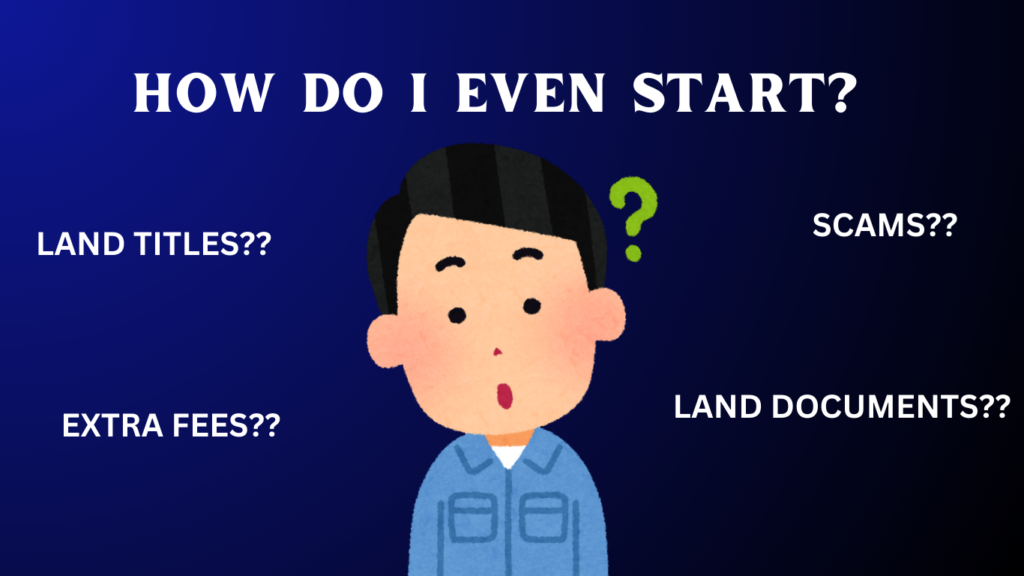What are the essential questions to ask before buying land in Nigeria, you may ask?
So you’ve made the decision and you’re certain you want to become a land owner. I want you to understand that buying land in Nigeria is a significant investment that requires careful consideration and thorough due diligence. Asking the right questions can help you avoid legal pitfalls and ensure a profitable purchase. These questions will save you from falling into the hands of scammers and the likes.
In this post, we’ll cover the 10 essential questions you must ask before buying land in Nigeria.

1. Is the Land Title Valid and Free from any hindrance or issues?
The first step in any land purchase is to verify the land title. In Nigeria, land titles can include Certificates of Occupancy (C of O), Deeds of Assignment, or Governor’s Consent. Ensure that the title is genuine, free from issues, and that the seller has the legal right to sell the land. You should also check if there are any pending disputes or litigation related to the land.
2. What Is the Designated Use of the Land?
Understanding the designated use of the land is crucial. Different areas in Nigeria have specific zoning regulations that determine whether land can be used for residential, commercial, agricultural, or industrial purposes. Make sure the land’s designated use aligns with your plans, and inquire whether the land use designation can be changed if necessary.
3. Are the Boundaries Clearly Marked and Surveyed?
Before finalizing your purchase, it’s important to verify the exact size and boundaries of the land. Request a recent land survey and ensure that the boundaries are clearly marked and accurately reflected in the survey plan. This step helps prevent future disputes and ensures that you’re getting what you paid for.
4. Are Utilities and Infrastructure Available?
Access to basic utilities like water, electricity, and sewage systems is a key consideration when buying land. Check whether these utilities are already available on the property or if they will be accessible in the near future. Additionally, consider the land’s accessibility via road and whether there are plans for infrastructure development in the area.
5. Is the Land Prone to Environmental Risks?
Nigeria has areas that are prone to flooding, erosion, and other environmental risks. Before purchasing, assess the land’s susceptibility to such hazards. Consider commissioning an environmental assessment or consulting with local experts to ensure the land is safe for your intended use.
6. What Are the Future Development Plans for the Area?
Understanding the future development plans for the surrounding area can significantly impact the value of the land. Are there plans for new roads, schools, hospitals, or commercial centers? These developments can increase the land’s value, making it a more attractive investment.
7. What Are the Total Costs Involved?
The total cost of buying land in Nigeria goes beyond the purchase price. Additional costs can include taxes, legal fees, survey fees, and community development levies. Make sure you have a clear understanding of all costs involved to avoid surprises later on.
8. Can I Review All Relevant Land Documents?
Before committing to a purchase, request to see all relevant land documents, including the Certificate of Occupancy (C of O), Deed of Assignment, and Survey Plan. Reviewing these documents with a legal professional ensures that everything is in order and that the transfer of ownership will be smooth.
These are some DOCUMENTS NEEDED FOR LAND PURCHASE IN NIGERIA
9. What Is the Potential Resale Value?
Consider the long-term value of the land. Is it located in a high-demand area that is likely to appreciate in value? Understanding the potential resale value can help you make a more informed decision and ensure a good return on your investment.
10. What Are the Community and Social Factors?
Finally, take into account the social and cultural factors of the area. Investigate the reputation of the community, the presence of any land disputes, and how these factors might affect your ownership experience. A peaceful and well-integrated community can add significant value to your land investment.
Conclusion
Asking these 10 essential questions before buying land in Nigeria will help you make a smart, informed decision. By conducting thorough due diligence and consulting with professionals, you can avoid potential pitfalls and secure a property that meets your needs and expectations.
Whether you’re purchasing land for personal use or as an investment, being well-prepared is key to ensuring a successful transaction. Remember, the more informed you are, the better your chances of making a wise investment in Nigerian real estate.
Now that you know all these check out SOME FACTORS TO CONSIDER BEFORE INVESTING IN REAL ESTATE



